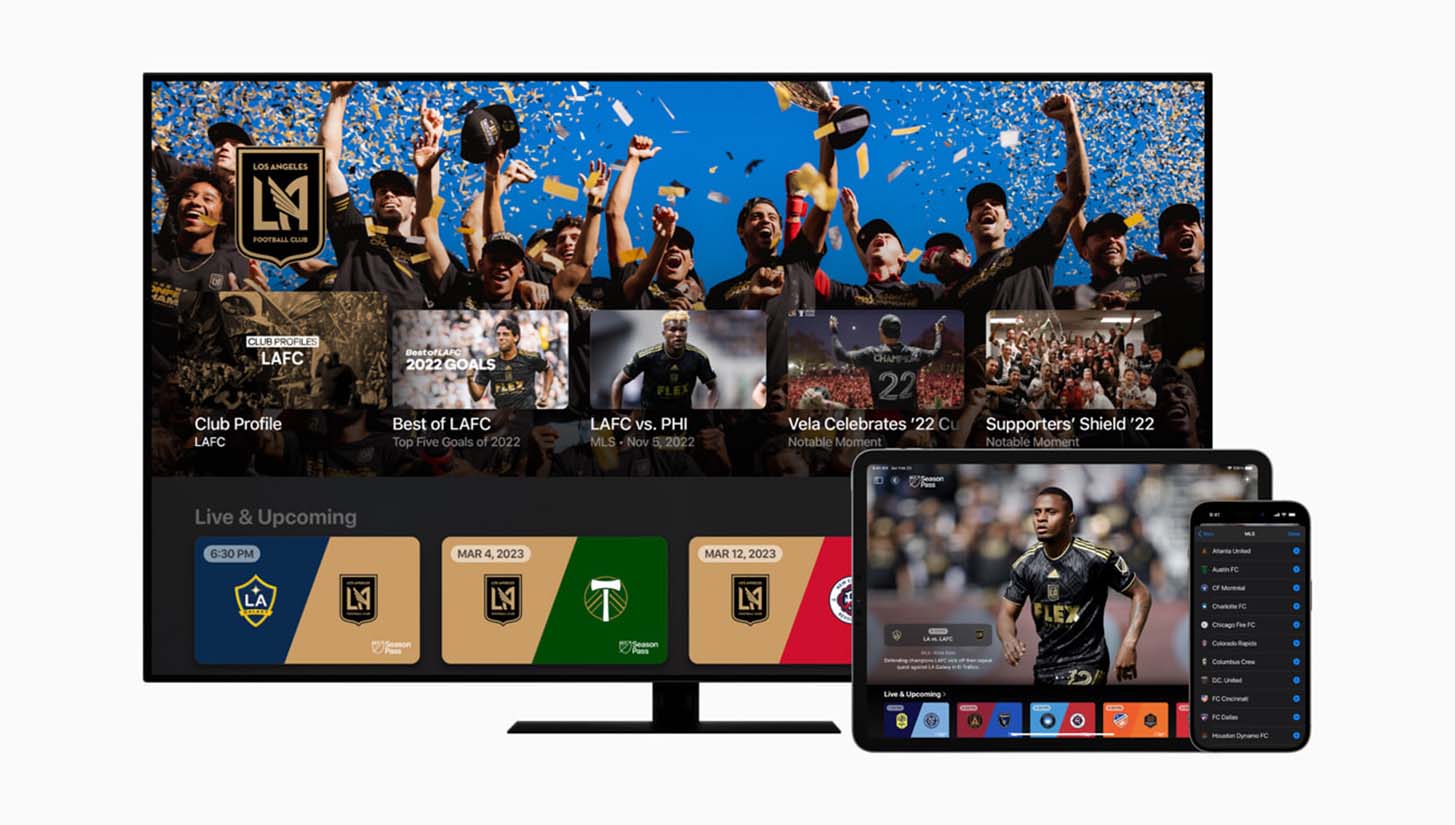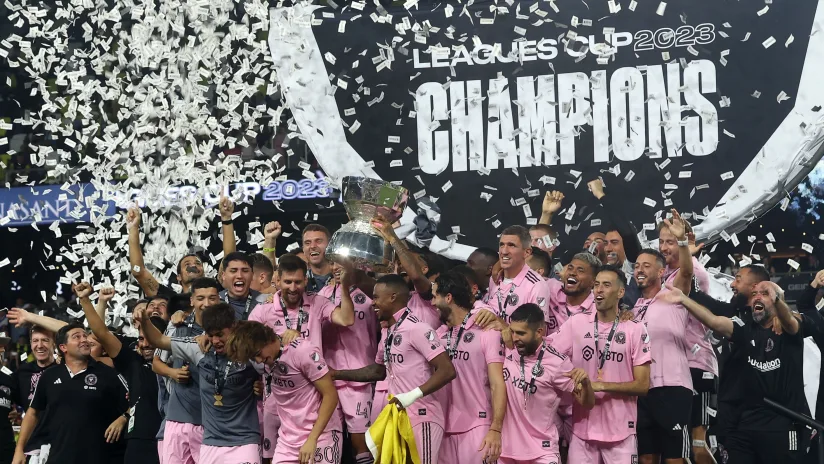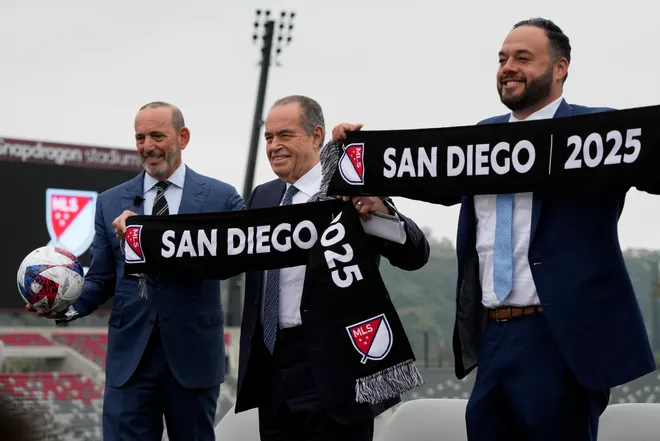Major League Soccer announced that it would be sending its MLS Next Pro sides to the U.S. Open Cup, but U.S. Soccer quickly denied the request, leaving the league with a lot of egg on its face. However, MLS is still determined to have total control over soccer in the United States.
On December 16, Major League Soccer sent a huge message to the rest of the country. If it doesn’t have full control over a situation you can forget the league wasting its time. The victim was intended to be the U.S. Open Cup, a tournament MLS commissioner Don Garber threw dirt on early this year, only to watch Lionel Messi’s Inter Miami semifinal match against FC Cincinnati be sold to various countries around the world.
What should have been a celebration of the potential of the tournament was seen as a threat by the league, handcuffed to an exclusive deal with Apple TV. MLS is hell bent on building Apple’s subscribers and not so much giving away what they are asking millions across the world to pay for, for “free.”
In this case it would have been Messi, the league’s most prized asset, lifting the U.S. Open Cup, not behind its Apple TV paywall, but open on a cable station for all to see.
In an interview with Bolavip, former United States men’s national team star and one-time U.S. Soccer presidential candidate Eric Wynalda tried to shine a light on what may have been going through the MLS commissioner’s mind when Argentine sports network TyC Sports bought the rights to the U.S. Open Cup games that featured Messi.
“When somebody came in from the outside (TyC Sports) and said, ‘I want to buy the rights (to the US Open Cup), I want to put this on television, I want to tell Messi’s story in the United States,’ that must have scared the hell out of Don Garber. That’s the last thing in the world that he needs.”
The Apple Deal

Since MLS announced its deal with Apple TV, the quality of the games on television has improved, and despite Apple and MLS vaguely reporting that MLS Season Pass is surpassing its metrics, not much is known as to how many people worldwide signed up for the streaming package.
The Leagues Cup, an unnecessary summer tournament designed to capitalize on Liga MX’s popularity in the U.S., was Messi’s first major showcase in MLS, but unless you were subscribed and paying for the service, the best player in history was and has been basically blacked out around the world.
In fact, since the Apple TV deal, finding anything on MLS that is mainstream is lacking — even the league’s YouTube page no longer has anything compelling. Everything essentially is in Apple TV far from the hands of the supporters or casuals.
Apple TV was supposed to be an innovative way to watch MLS, but it would seem it is taking an old concept known as pay-per-view and applying it to all aspects of the league.
Is MLS Isolating Itself?

With the MLS regular season and playoffs behind the Apple TV paywall, Leagues Cup is yet another property that showcases MLS, but watching anything save for highlights outside of Apple is severely limited.
Garber, during an end of tournament speech about the Leagues Cup, stated that MLS would be open to having more teams and more countries competing in the tournament. While those words were brushed off by some, others found it powerful.
Is Leagues Cup designed to be a sort of Copa Libertadores in the future? Is Garber’s master plan to create some kind of World Cup-style Super League format? It would appear so, as MLS needs as many subscriptions to Apple TV as possible, and in a post-Messi world getting the most popular teams in the region to compete in a yearly tournament would be a viable way to keep MLS relevant with worldwide appeal.
Still, knowing what MLS may want to do with Leagues Cup, many pundits are concerned if MLS has possibly given up on the idea of entering a prestigious tournament like Copa Libertadores, or how seriously it will take the CONCACAF Champions Cup moving forward.
In the end, the MLS-Apple TV business model is about getting new subscribers, and everything outside that model is seen as “giving it away for free.”
MLS has essentially created its own tournaments. Rather than improving its teams to have a better chance in CCC, the league would rather have its product highlighted in lieu of tournaments where MLS would have to share some of the revenue.
Leagues Cup and Campeones Cup are MLS’ answer to what they can’t achieve by their own means most of the time. They are paper competitions designed to self-serve MLS’ idea that the league is growing on par with many of their counterparts and to drink their own Kool-Aid. It’s basically the American mentality that “if you can’t beat them, create it.”
MLS Wants Control of the Pyramid

Not only is MLS inventing its own competitions to cash in on, but also the league, according to a Yahoo report, is looking to finally do away with their competition by absorbing or expanding to cities that MLS may have looked over.
According to the report, MLS wants to have a footprint everywhere.
“Looking ahead to the World Cup in 2026, we want to be in as many markets as we can be that want professional soccer,” Charles Altchek, president of MLS Next Pro told AFP.
What hasn’t been mentioned is that by expanding even further, MLS is killing all the local soccer clubs. The league would rather have fanbases opt for a franchise model, while systematically driving those clubs that are not within their model into the ground.
As was the case of the San Diego Loyal, when the MLS San Diego expansion team was announced, almost immediately the Loyal closed operations. Competing with a $500 million expansion fee was too much to handle day in and day out for the Loyal.
Before the 2026 World Cup, MLS is hoping to control the pyramid by being the pyramid. While cold blooded as it sounds, it’s the only natural progression. If all roads in England lead to the Premier League, in MLS eventually all roads will lead to MLS, and not end with the USL.
MLS may take a page from the Japanese J. League which has become three divisions strong with promotion and relegation. Although pro/rel may not happen anytime soon in MLS, having its own standalone pyramid in place could lead to that smooth transition.
“We think it’s really important to explore what opportunities there are to have the team playing in a different place and activate a new fan base, activate a new market, bring professional soccer to a new market. We think it’s a really tremendous opportunity to do that,” said Altchek in that Yahoo article.
Major League Soccer is already thinking about post-2026 and what that will mean for the by then 30-year-old MLS, its future, and the future of soccer in the United States.
One thing is for certain — sooner or later, MLS will have it all, and the USL along with even U.S. Soccer itself may be pushed to the side.








